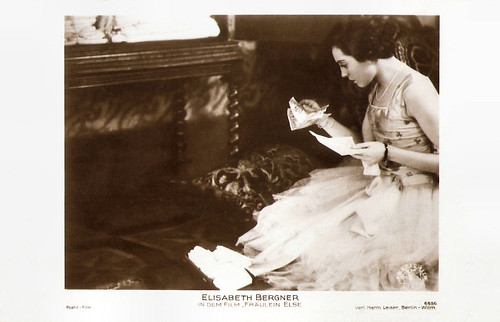
German postcard by Verlag Hermann Leiser, Berlin-Wilm, no. 6656. Photo: Poetic-Film. Elisabeth Bergner in Fräulein Else/Miss Else (Paul Czinner, 1929).

German postcard by Verlag Hermann Leiser, Berlin-Wilm, no. 6568. Photo: Atelier W.v. Debschitz-Kunowski, Berlin. Elisabeth Bergner in Fräulein Else/Miss Else (Paul Czinner, 1929).
Clad only in a white fur coat
In Fräulein Else/Miss Else, Elisabeth Bergner plays the carefree daughter of a Viennese lawyer. She is spending a happy winter holiday in St. Moritz, with her cousin Paul (Jack Trevor) and his mother (Adele Sandrock).
Then she receives the news that her father (Albert Bassermann) is in financial distress: he has gambled away his clients' money on the stock exchange. Only the wealthy art dealer Von Dorsday (Albert Steinrück), who is also in St. Moritz and has his eye on Else, could save him.
Else asks him for the money, but he sets one condition. He wants to see Else naked. She struggles with her decision. Finally, she takes poison and goes to him, clad only in a white fur coat. In the hotel bar, in front of everyone, she lets the coat slip down before his eyes and dies.
Fräulein Else was scripted by Paul Czinner and Béla Balázs, and cinematographed by Karl Freund, Adolf Schlasy and Robert Baberske. Exteriors were shot in Vienna and St. Moritz. The German premiere took place on 7 March 1929 at the Berlin cinema Capitol.

Austrian postcard by Iris Verlag, no. 5689. Photo: Poetic Film/Lux-Film Verleih. Elisabeth Bergner in Fräulein Else (Paul Czinner, 1929).
The great creator of soulful nuances
While the Geman press was extremely laudatory about Bergner and Czinner's previous films such as Liebe (1927) and Dona Juana (1928), it was more critical of this film. Unjustly perhaps, for when we saw the film in 2004 at the Cinema Ritrovato festival in Bologna, it was a heartbreaking film, that well expresses all of the mise-en-scene and cinematographic mastery of late 1920s German cinema.
Rudolf Kurtz in Lichtbild-Bühne, 8 March 1929: "The renunciation of all noisy, theatrical effects leads Czinner to seek his effects with quiet, dramatic means. He masters the register of retardation: it is excellently done how Bergner does not dare to address the brutal fellow, how she runs after him, turns away, approaches again, disappears behind a pillar, again a few steps forward - until the final meeting seems almost like a dramatic redemption.
Czinner uses the same means to stage the end, when the Bergner goes into the art dealer's room, does not find him, and pursues him - while the poison is already destroying her vital forces. Czinner has written the manuscript with a haunting rigidity for Elisabeth Bergner, as he conceives her. For him, she is the great creator of soulful nuances, of delicately passing spiritual subtlety, a person who expresses her inner self completely with rare art.
This is undoubtedly Bergner's strength, but this art alone does not provide the prerequisites for an effective film. Film effect is a dramatic effect with optical means: and what Bergner needs above all is the strong, firmly established dramatic framework into which she can fit, which provides the possibilities for her skill, and at the same time engages the spectator in the structure of a plot that goes to the heart.
It must be said again and again: Bergner is a great possession of German cinema. There is hardly an actress in the whole world whose face, whose body is such a pure expression of her inner life. With an inconceivable clarity, the sorrow and joy of her soul speak from her expression; here is a precious material that can only be classified in cinematic occasions with a strong hand. Only an artist of high rank is able to create an inner tension with pictorial monologues, without a partner, relying only on herself, which has a genuinely dramatic effect."

German postcard by Verlag Herm. Leiser, Berlin-Wilm, no. 6657. Photo: Poetic-Film. Albert Steinrück and Elisabeth Bergner in Fräulein Else/Miss Else (Paul Czinner, 1929).

Vintage postcard, no. 3950. Photo: Atelier Geiringer & Horovitz (Trude Geiringer & Dora Horovitz), Wien. Bergner wears the fur coat from the final scene in Fräulein Else.
Sources: Filmportal (German), Wikipedia (German) and IMDb.
No comments:
Post a Comment